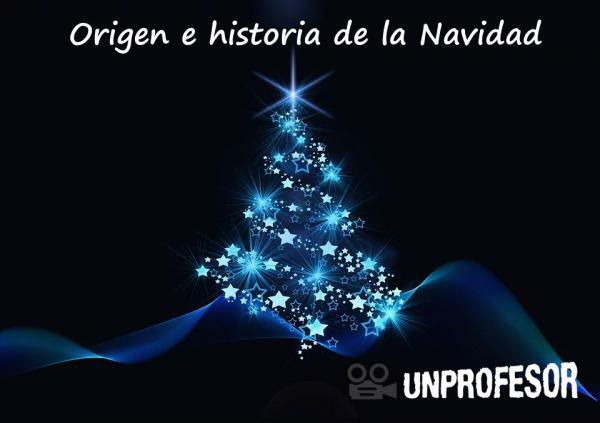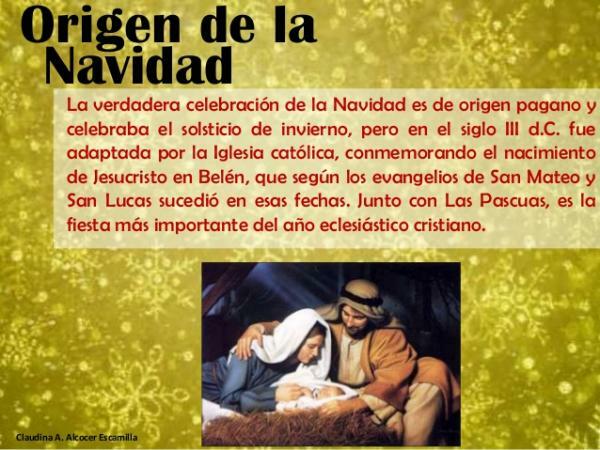CHRISTMAS: history and origin

Of all the religious festivals that exist in our world, possibly the best known to all is Christmas, being one of the most celebrated and with the greatest weight in Western culture. Linked to the Christian religion, Christmas is a celebration that worships the birth of Jesus Christ, the son of God. To know the birth and evolution of this important celebration in this lesson from a PROFESSOR we are going to talk about the history and origin of Christmas.
Index
- What is christmas?
- Christmas origin
- Brief history of Christmas and its evolution
What is christmas?
First of all we must try to define the concept of Christmas, since on many occasions we do not know with The reasons for this holiday are certain that part of the population celebrates it or what are its main features.
Christmas is a Christian holiday, being considered one of the most important festivals of this religion due to its great tradition. It is generally celebrated December 25, although in some religions as are some orthodox slopes is celebrated on January 7th.
Over the years, Christmas has grown more and more traditions, becoming a great event throughout the planet based on exchange. gifts and certain family traditions such as great banquets, thus disappearing the original values of this festivity.

Christmas origin.
To talk about Christmas we must go back to its origins, being then very different from the current holiday and having little to do with Jesus, unlike contemporary Christmas.
The Romans celebrated a festival on December 25 called Saturnalia, being a party that honored the god Saturn and that served to welcome the winter solstice. These parties were pagan and in them a series of follies were carried out that were not well seen by Christians, since they collided in great measured with their mentality, this being the reason why Christians began to celebrate Christmas as a way from replace this pagan celebration.
With the growing influence of christianity In Roman culture, Christmas was gaining more and more relevance, leading to a time when the one that the Roman emperor himself gave greater importance to the Christmas festivities than to the Saturnalias. This christmas they were very different from ours, being parties in which they did not eat or drink too much, being civic parties.
Therefore, although the celebration of Christmas is based on the birth of Jesus, as we can see its origin born of the Saturnalias, so we cannot be totally sure that the date on which it is celebrated, December 25, coincides with the birth of the Messiah, or if, on the other hand, it is only placed on that date as a form of boycott of the pagan festival Roman. Although in the Gospels the birth of Jesus is not mentioned at any time, the different traditions religious have ended up placing his birth on December 25, as a way of giving meaning to the feast of the Christmas.

Brief history of Christmas and its evolution.
To continue with this lesson on the history and origin of Christmas we must talk about the evolution of this holiday throughout history, since that from its origin on Roman soil to its conversion into the main Western Christian festival has undergone a great deal of changes of diverse nature.
Initially Christmas was not considered a Christian holiday, since it was not located in the list of celebrations that the Christians had to celebrate. It is not until 200 AD C. in the city of Alexandria, texts begin to appear on the importance of the existence of this festival. It was at this time that the first studies on the possible date of birth of Jesus, and it is the moment that the first celebrations of December 25 of Christmas begin. Already in the fourth century, and after several Christian meetings, December 25 had been set as a Christmas holiday in the festive calendar of different Christian churches.
Christmas in the Middle Ages
It was in the High Middle Ages when the christmas party became one of the most important of the Christian world, even more so with the arrival of dates in which it was thought that society would receive punishment from God. It was at this stage that the whole Christian world already celebrated Christmas, since from the Christian monarchies Europeans sought to consolidate these celebrations to entertain the people and give greater importance to religion Christian.
The feast of Christmas was so closely linked to Catholicism that when theProtestant Reformation was prohibited in some of the territories where this religion appeared, being considered a party at the service of the Pope and that it came from the Roman pagan festivals. Little by little, and with the arrival of different Christmas reforms, it was celebrated again in Protestant lands, although even today there are Protestant voices against him.
Christmas today
Today the feast of Christmas has surpassed religion and there are many non-believers who celebrate these holidays, being less and less related to the birth of Jesus and more focused on family gatherings where gifts are exchanged, large amounts of food are drunk and eaten. Therefore we can say that the Christmass that sought to replace the madness of the Saturnalias have ended up becoming some similar holidays, where religion already has an almost tertiary importance compared to Christmas medieval.

If you want to read more articles similar to Christmas: history and origin, we recommend that you enter our category of Story.
